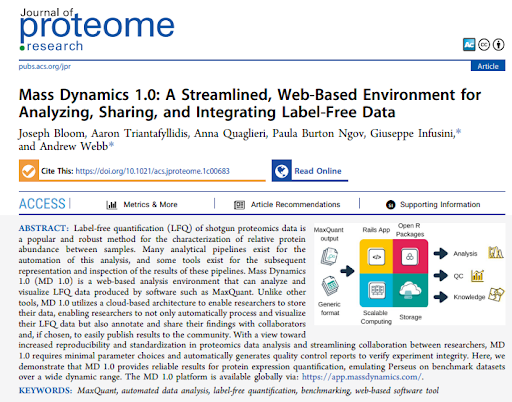Last week, the Mass Dynamics (MD) team published our first peer reviewed article in the Journal of Proteome Research. This article was the culmination of a large team effort, developing the code, benchmarking and ultimately, honing our philosophy and approach.
As the first author of this paper, I am both tremendously proud of this work and passionate about what this means for the future of MS research. .
MD 1.0 represents a foundation stone of our mission at MD - to help life scientists transform proteomics data to knowledge so they can free humanity and society from the burden of disease. Here, I would like to share with the scientific community, our users and other tool builders how we at MD plan to revolutionise the way we think about and perform proteomics.
Accelerating proteomics by democratising mass spectrometry data processing
Proteomics, the large-scale study of proteins, is essential for unlocking the next generation of medical breakthroughs. While we now are beginning to fully appreciate the extent by which biology and disease are governed by proteins and their modifications, we still understand so little of the proteome compared to the genome.
We believe the tools to unlock the vast pool of incredibly complex information exists, but they remain inaccessible to most of the world's life scientists and biologists. Collectively the MD team share a strong passion to break down technical barriers and build the (software) bridges that will facilitate unleashing incredibly powerful technologies such as Mass spectrometry-based proteomics (MSP). MSP is especially ripe for dissemination as a tool for biologists because of recent instrumental and technological advancements that see it rapidly growing in its capacity to deliver insights with confidence.
Through our careers, we’ve come to appreciate just how complicated data processing and analysis in MSP really is (particularly for outsiders and newcomers to the field). This complexity has also meant that we have become incredibly dependent on experts, where access for the wider community is limited by collaborations or expensive contract research.
Here, in addition to providing better tools that reduce these barriers, we share a strong belief that significant efforts are required to better educate and cultivate the next generation of proteomics scientists, and in particular balance the gender gap in our field. Ultimately to succeed in our mission, we need more people able to leverage MSP, not less.
That’s why we built Mass Dynamics 1.0 as a proteomics environment with accessibility at the core.
If more experts, biologists, and tool builders from a wider variety of backgrounds can collaborate on, use and deliver insights using easy-to-use, trustworthy and scalable software, we just might be able to revolutionize proteomics and consequently, medicine.
How does MD 1.0 democratise MSP?
In the MD 1.0 paper, we articulated our philosophy and methods for automating the data processing and analysis component of MSP, allowing the technology to be accessible without compromising accuracy or transparency.
For science to be safely automated, and therefore democratized, we need tools that:
- Process data using peer-reviewed and heavily validated methods.
- Work towards standardisation, improving over time but not degrading.
- Measure and estimate the data quality on every dataset analysed.
This is what we deliver with MD 1.0 along with easy-to-use interfaces, shareable, secure cloud based experiment storage and knowledge integration and analytical tools for processed data.
Bringing these things together creates an environment where biologists can analyse proteomics data quickly and with confidence and easily collaborate with mass spectrometry experts at the same time.
Revolution and the future of proteomics
Proteomics is well on the way to fundamentally changing the health landscape and we look forward to playing our role in helping bring access to where it’s needed most. As Shakespere put it “It is not in the stars to hold our destiny but in ourselves". Our destiny belongs not just in the hands of the few, but of the many.”
From many backgrounds, the MD team has come together to build services that will democratize and accelerate proteomics. We are immensely grateful for the support, review and discussions we continue to have with the proteomics and Mass Spectrometry communities which enable us to continue to refine our ideas and tools.
We look forward to evolving MD 1.0 to further enable the research community to unearth the mysteries of the proteome and build the medical technology of the future.

